PEN World Voices Festival: Writing Truthfully for Kids About Today’s Issues
The PEN World Voices Festival returned to in-person last week with 45 panels taking place in New York City and Los Angeles. The Children’s and Young Adult Books Committee organized one of those panels, “Writing Truthfully for Kids About Today’s Issues,” which drew a full house to hear Zetta Elliott, Kyle Lukoff, Ruta Sepetys, Traci Sorell, and moderator Padma Venkatraman talk about book bans, age appropriateness, and ways that books can bring communities together and be a force for positive change.
Padma began the 75-minute event by mentioning an interview Ali Velshi did with actor and author George Takei, who grew up in a Japanese-American internment camp during the Second World War. Although the incarceration of Japanese Americans took place in the past, that experience is relevant today, as exemplified by the attempt by publisher Scholastic to censor backmatter in a book fair edition of Maggie Tokuda-Hall’s picture book Love in the Library, about her grandparents’ meeting in one of those camps.
Zetta explained that all of the panelists have had books banned, but the brunt of book banning has targeted books by LGBTQ+ and BIPOC (Black, Indigenous & people of color) authors. Banning books by authors and illustrators who share their backgrounds and depict their lives makes children feel they don’t belong. Zetta mentioned that she is an immigrant and knows what it’s like not to belong. She celebrates the activism of young people who have stood up to book bans and defended their own right to read books that reflect their experiences and the experiences of their neighbors. In the words of Dr. Rudine Sims, books should be mirrors, windows, and sliding glass doors.
Traci, who is a member of the Cherokee Nation, added that only as an adult did she learn about histories and realities that should have been taught to her when she was younger.
Padma asked how we fail by avoiding certain topics. Kyle, who worked as a school librarian for many years before becoming a full-time author, pointed out that children are human beings who deserve access to information as well as art and literature that speaks to their intelligence and emotional needs. Hiding information from children — as many parents did during the Black Lives Matter protests — makes children feel less safe. It’s important to give them the truth.
The next topic had to do with how authors can avoid self-censoring in the face of uncertainty and pressure. Traci felt that we’re in a cycle in which leaders exploit hot-button issues for political advantage. She echoed Kyle’s point that we need to respect the intelligence and emotional development of children and teenagers. While publishers have generally been supportive, authors and illustrators are freelance contractors with few rights and little clout. And “a lot of things happened under Trump that we will not come back from.” She asked if we will self-censor as a result.
Ruta said that writers need to have conversations with publishers to find out to what extent publishers will protect creators. She has had extensive experience in other countries, some of which have banned her books and repressed their own writers.
Zetta observed that marginalized writers can’t get published, even for mainstream stories. Padma lamented authors’ lack of power. Kyle described how he self-censored in his first book with a transgender protagonist. In order to present this trans child to the broadest possible audience, he avoided politics altogether. He created a wholesome, mainstream family. The censors targeted his book anyway. So now he’s given up trying to appear apolitical. Traci had the same experience. Her first picture book addressed the theme of gratitude, and it was banned.
Reasons for banning are often ridiculous and show the ignorance and lack of intellectual rigor on the part of the banners. For instance, someone tried to ban Zetta’s picture book A Place Inside of Me, illustrated by Noa Denmon, because it had a “Cuban flag” and thus supported communism. The flag in question was the Puerto Rican flag, not the flag of Cuba. Ruta’s debut novel Between Shades of Gray was banned because people confused it with the erotic bestseller 50 Shades of Gray.
While these reasons are laughable, the result — denying readers access to books — is serious. Padma asked about resources available for people fighting book bans.
Zetta suggested authors find out what the community needs. Kyle noted the temptation, once an author’s books are banned, to “parachute” into a place to defend their work. But there are better ways, such as using humor. Zetta wrote and self-published a picture book, Chicken Wonders Why, as a lighthearted answer to a woman who asked why authors couldn’t simply write books about chickens. Both Zetta and Kyle added that it’s important to connect with those in the community who are opposing censorship. Kyle works with LGBTQ+ people and allies, and once his parents spoke at a community meeting where his book was challenged.
Traci asked “Who are kids living with?” “Who are they living around?” She suggested requesting books at the public library and talking to people in our own communities. She shared three websites of organizations fighting for the freedom to read: everylibrary.org; everylibraryinstitute.org; and fightforthefirst.org. She also observed that only 2-3% of the members of a community are activists on either side; 95% are unaligned, undecided, and/or uninformed. It’s important for all of us not to be a passive “foot soldier” in censorship but to inform ourselves and our neighbors.
Ruta spoke about the conversations she has had in her travels. She lives in Tennessee, one of the places where censorship is rife and two state legislators were removed from their elected positions for speaking out in favor of gun control legislation following a mass shooting at Nashville school. But in neighboring Kentucky, she saw community members rejecting divisiveness and wedge issues because if communities can’t work together to solve life-threatening problems like the opioid epidemic and natural disasters, all are endangered. Communities in Minnesota have taken positive steps to prevent irresponsible book banning by disallowing people without children in the schools to demand book bans in the schools. Anyone who wants a book removed has to write a detailed reader report, and it turns out no one wants to do that much work! She takes heart in the fact that people want to speak to their neighbors again, that young people are speaking out against both book banning and gun violence, and they are convincing their parents to get involved.
Kyle mentioned the sentence, “Parents have the right to keep their own child from a book, but they don’t have the right to keep other people’s children from reading a book.” While this is a popular way of framing opposition to book banning, he’s uncomfortable with parents being able to deny their own children access to information. When he was a librarian, he encouraged children to have conversations with parents about their reading material and the need for access to more. Traci agreed, adding that sometimes children in abusive situations need the help of books to figure out they’re in dangert. What is the true agenda of parents and others who deny those books to children? Padma gave the example of both children and adults in domestic abuse situations who were empowered to seek help and safety after reading her novel The Bridge Home.
Padma then asked the authors how they figure out the target age of their audience. Kyle said all his stories are about someone who wants something badly and has to figure out a way to attain it. The format drives the age group. His years working in schools has given him an intuitive sense of the plots and structures that will work for different ages. Zetta added that the publishing industry has conventional conceptions of target age groups, which has been a challenge for her as she writes picture books like Bird and A Place Inside of Me that are geared to older readers. Traci talked about how she chose to make We Are Still Here a picture book to reach the widest possible audience.
Audience members had questions as well. I promise I didn’t plant this questioner, but one person asked if any books offered perspectives on censorship throughout history. Zetta cited Torch and asked me to talk about how the teenage protagonists in Czechoslovakia responded to the reimposition of strict censorship after the Soviet invasion that crushed the democratic reforms of the Prague Spring. In that case, banning books was part of a broader persecution of people who didn’t obey the regime. And usually book banning is one aspect of a much broader attack on personal freedom and human rights.
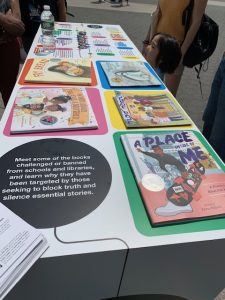
An exhibit of banned books at Union Square, part of the festival, highlighted picture books by Zetta Elliott and Kyle Lukoff.
Building on that point, another question tied book banning to the war on humanities. Zetta called it a war on stories and the imagination, and Padma added that it’s a war on public libraries, public spaces, science, and the truth. “A war on storytelling,” Traci said. Zetta observed that the right wing are masters of narrative, a kind of perverse narrative that pushes aside the imagination in the form of both individual and community storytelling in favor of top-down narratives that uphold power.
At this point, we ran out of time, but we could have talked much longer about Zetta’s last point, which I’ve touched on in a previous blog post and hope to discuss more in a future one. In closing, our excellent moderator, Padma, reminded us that many outstanding books are banned that never get the spotlight. No one buys them in multiple copies or celebrates the publicity they receive. They simply disappear, and the readers who need them most never find out about them at all.

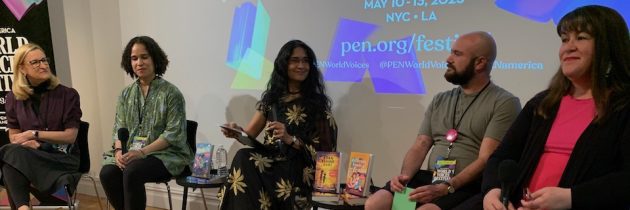
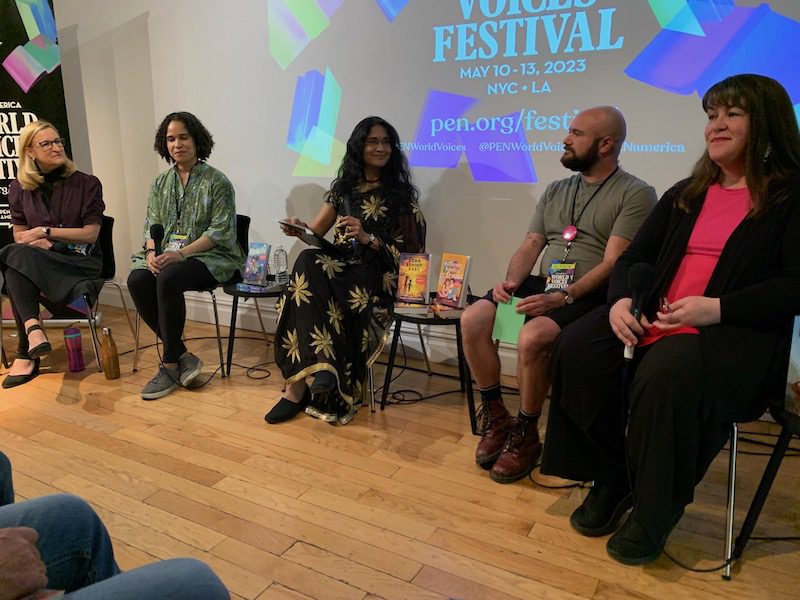
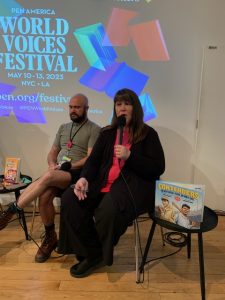
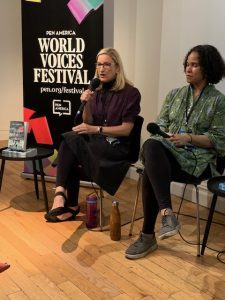
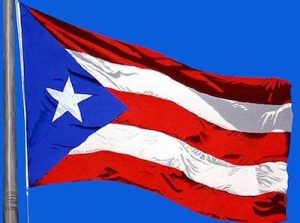
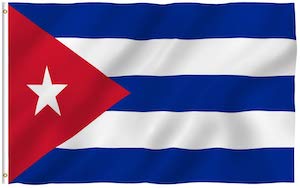
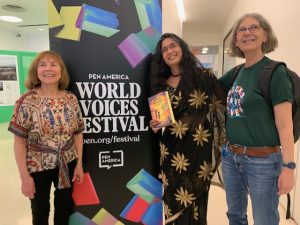
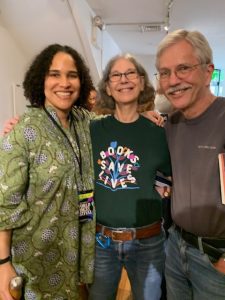





It was a really terrific panel discussion — and this is a wonderful summary of it. Too bad they didn’t record it, but this is a very complete summary! Thanks!
Amy Nathan